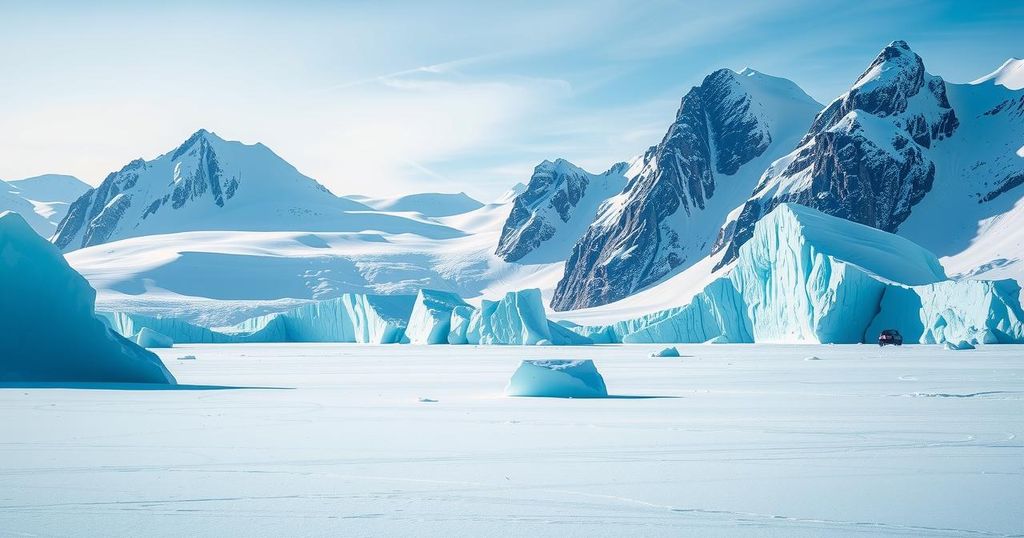World news
AP, ARCTIC, ASIA, ASSOCIATED PRESS, ATAQATIGIIT, CROATIA, CUBA, DEMOCRACY, DENMARK, DORIS JENSEN, ELECTIONS, EUROPE, EUROPEAN UNION, FLORIDA, GOVERNMENT, GREENLAND, INUIT ATAQATIGIIT, JAPAN, MAR - A - LAGO, MUTE, NORTH AMERICA, NORTH ATLANTIC, NUUK, PIP, PIPALUK LYNGE, PITUFFIK SPACE, PITUFFIK SPACE BASE, POLITICS, POPULISM, SIUMUT, SOCIAL DEMOCRATIC, THE ASSOCIATED PRESS, THULE AIR FORCE BASE, TRUMP, U. S, UNITED INUIT, UNITED INUIT PARTY
David O'Sullivan
0 Comments
Greenland’s Elections: A Strategic Decision Amid U.S. Interests
Greenland is conducting significant parliamentary elections under the gaze of U.S. President Donald Trump, who seeks control over the territory for its strategic location and rare earth minerals. As the population debates independence, they contemplate how best to secure their future without relinquishing their autonomy. The electoral process showcases their ambitions amidst international media interest and environmental concerns.
Greenland is poised for significant parliamentary elections, with attention focusing on the strategic interests of the United States. President Donald Trump has expressed a desire to control the island, valued for its North Atlantic location and abundant rare earth minerals essential for the global economy. Although Trump’s aspirations are not officially included on the ballot, they permeate the discussion.
The capital city of Nuuk houses the only polling station for this self-governing territory of Denmark, which has a population of approximately 56,000, predominantly of Indigenous Inuit descent. Since 2009, Greenlanders have been contemplating independence, with the current political climate prompting citizens to consider how best to secure their autonomy.
Member of Parliament Pipaluk Lynge, representing the ruling Inuit Ataqatigiit party, echoed concerns regarding Trump’s interest. She stated a strong desire among Greenlanders for closer ties with Europe to bolster their sovereignty. Opinion polls reveal a significant inclination among the populace towards independence, although they maintain positive sentiments towards Americans, particularly regarding the long-established relationship with the Pituffik Space Base.
Despite admiration for the U.S., there is no inclination among Greenlanders to pursue American citizenship. This sentiment is held even by devoted Trump supporters like fisherman Gerth Josefsen, who advocates for Greenlanders to determine their own fate, emphasizing that while the territory is welcoming to business interests, it is not for sale.
Doris Jensen, from the Siumut party, remarks that Trump’s attention has accelerated the push for independence within her party, transforming the typical local democratic landscape. The presence of international media has underscored the unusual nature of this election season, as evidenced by the attention surrounding the Prime Minister’s final debate.
In this different political climate, candidates focused on issues such as workforce development and infrastructure, rather than engaging in confrontational debates. On election day, the polling venue will feature campaign activities and community engagement, including complimentary refreshments.
As the votes are cast, unofficial results will be available shortly after polls close, although the certification will take longer due to the island’s vast and challenging geography. Despite concerns regarding environmental regulations and the feasibility of resource extraction, Greenlanders remain optimistic about harnessing their natural resources to diversify an economy reliant on government employment.
In light of the recent harsh weather conditions impacting communications and transportation, local residents have adapted by seeking indoor pastimes. Amidst these climatic challenges, Greenlanders are well aware of the value they hold and the pivotal decisions that lay ahead.
The elections in Greenland represent a crucial moment as the territory weighs its future amidst external pressures, notably from the United States. The desire for sovereignty among Greenlanders remains strong, reflecting a collective aspiration to shape their destiny. The election process not only highlights the growing momentum for independence but also underscores the importance of global attention on this strategic and resource-rich region.
Original Source: www.2news.com




Post Comment